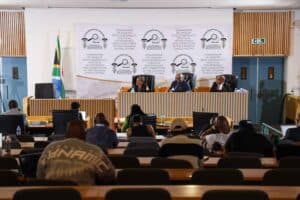He faces increased voter apathy, people’s unhappiness with a government struggling to contain soaring unemployment, a stagnant economy, lack of service delivery and an inefficient power utility, two political experts warn.

President Cyril Ramaphosa is in a fight for his political life as the battle for the soul of South Africa picks up ahead of the 2024 polls.
He faces increased voter apathy, people’s unhappiness with a government struggling to contain soaring unemployment, a stagnant economy, lack of service delivery and an inefficient power utility, two political experts warn.
As a debilitated ANC, rocked by corruption claims, gears up for its elective conference in December, it could narrowly scrape through 2024 with a 40% to 50% majority.
However, the ghosts of problems past will come back to haunt it and Ramaphosa. The spotlight will first fall on the outcome of the watershed ANC national elective conference in December.
Dirk Kotzé, political science professor at the University of South Africa, and Dr Ntsikelelo Breakfast of the department of history and political studies at the Nelson Mandela University, independently agreed fragmented opposition parties were still too weak to unseat the ANC.
Breakfast said: “Despite having been nominated by many provinces, the Phala Phala scandal is posing a serious threat for Ramaphosa’s chances of a smooth reelection – the only thing that can hold him back.
“We saw him being brought back to parliament to answer questions on what happened at Phala Phala because there was a cover-up by the Speaker of the National Assembly. “This tells the electorate that the ANC is falling short on issues of good governance and accountability.
“President Ramaphosa has been campaigning to become president of the ANC on the ticket of good governance, but now refuses to be accountable.”
Breakfast said a one-party dominance “has become a thing of the past for the ANC, with the hegemony of the party having fallen below 50% in last year’s local government elections”.
“Known for weaknesses in his leadership style, Ramaphosa has made commitments and not honoured them, with the economy not growing in the manner it should have, [with] unemployment sitting at 34%, worse among young people and women.”
The 2024 polls were likely to see another decline in ANC votes and an increase in voter apathy. “Last year’s local government polls outcome means if the ANC was contesting national elections, it would have been voted out.
“There is a connection between service delivery, development and voter turnout because people are no longer gullible. People don’t vote for the sake of voting. They know their votes have a meaning.
“They have not seen a real change for the better since 1994. “If you want to see people showing up at the polls, you also need to promote development.
“If public services are not rendered, that is enough to drive voters away,” Breakfast said. Turning to opposition parties, he said: “Fragmentation has weakened them. They are failing to capture the imagination of the electorate.
“With Mmusi Maimane having launched his own political party, which has compounded the situation, a fragmented political spectrum has set in. This gives the ANC an upper hand, with the status quo remaining unchanged.
“The ANC might return to power by getting 50% on the dot. “Opposition parties need to work as a unified force or face splitting their votes.”
Predicting that the ANC would struggle in its bid to return to power after the 2024 polls, Kotzé said: “I don’t think the ANC can expect to come back after 2024, because its decline is inevitable – which is going to continue.
Is biggest problem is infighting.” Kotzé said opposition parties “have constituted coalition alternatives, a strength tested at local government level”.
“This presents some of the options in 2024. “The weaknesses of all the parties, is that they are not growing and not substantially in decline. Currently there is no party which is an alternative to the ANC.
“The problem with opposition parties is that they are concentrated in one or two provinces and not widespread.
“Another problem is that almost all parties are not representative of the SA population.”
ALSO READ: Ramaphosa already has second term in the bag – analyst






